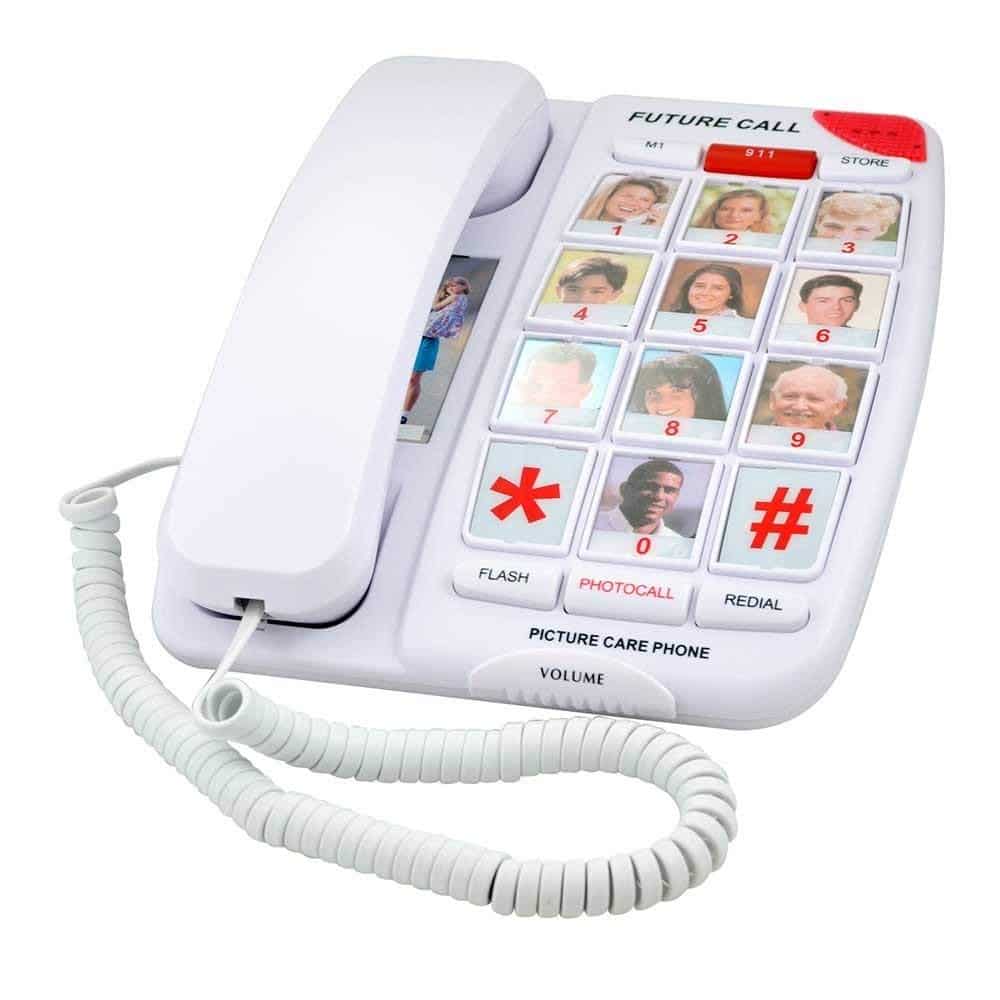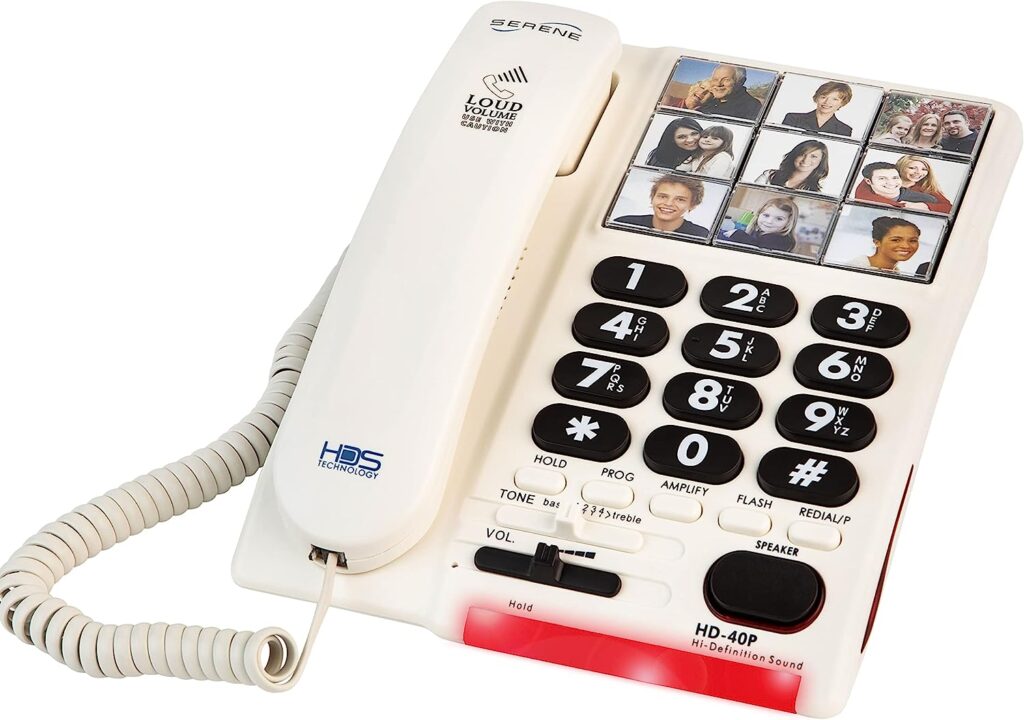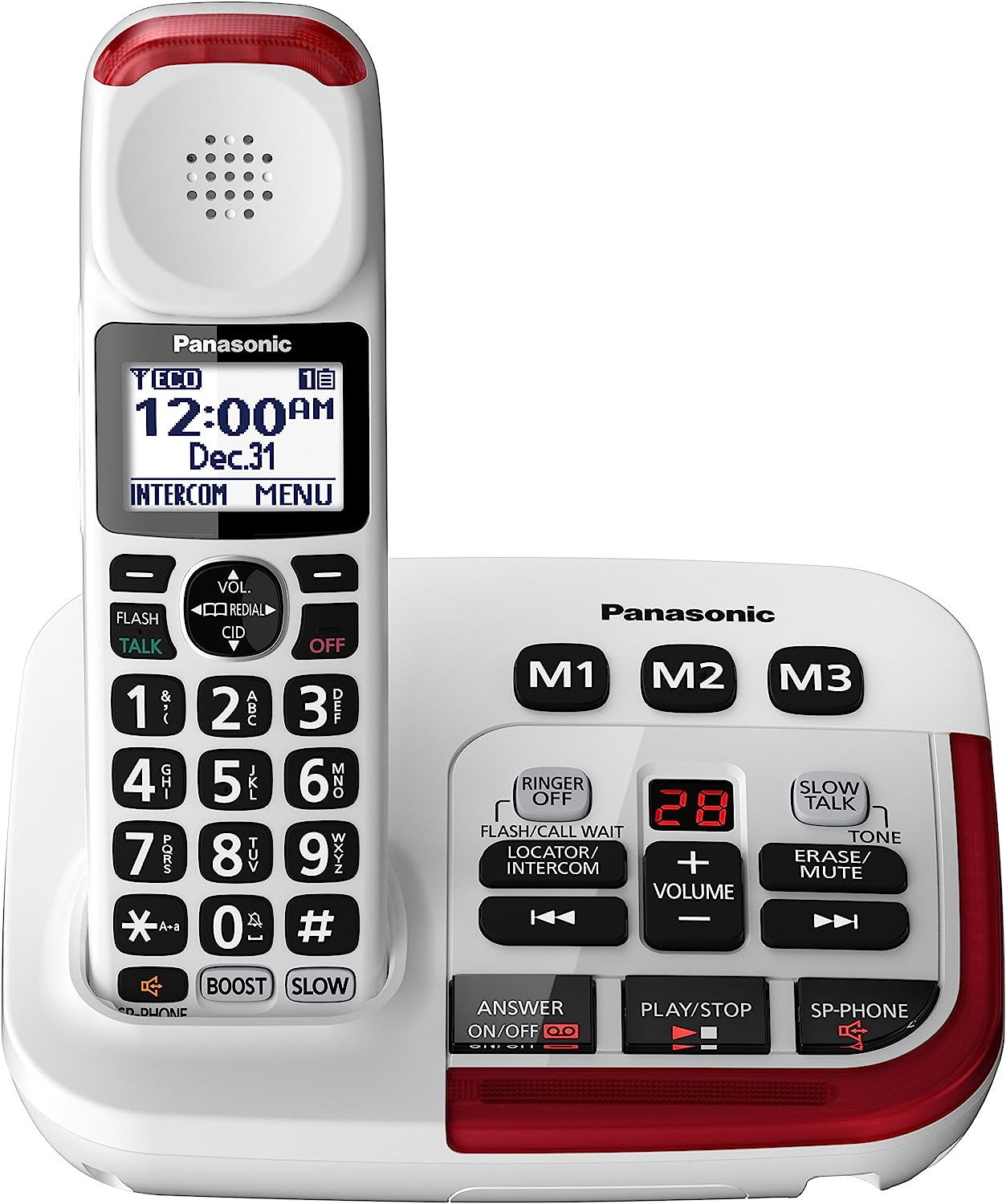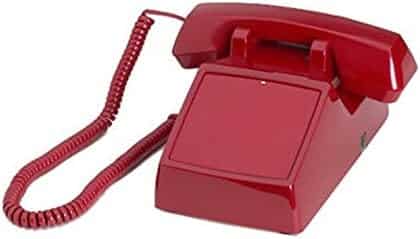Best Home Phones for Dementia and Alzheimer’s
Choose the best home phone for your loved one living with Alzheimer’s or other dementias. These phones often have features like large buttons, picture dialing, hearing aid compatibility, and more to help them communicate with family easily.
Pair your home phone up with our highly-rated teleCalm senior phone service and automatically block would-be scammers, repeat calling, and unneeded 911 calls.
How to Pick the Best Home Phone for A Loved One with Dementia
Popular phones often frustrate seniors living with dementia, causing numerous problems and increased stress for the senior and their family. In our experience, such problems can be solved – allowing most seniors with dementia to use a home telephone far along the dementia path.
We created this guide to help caregivers pick the best phone for their loved one’s particular needs. We also explain how a dementia-friendly phone can be enhanced by pairing it with a dementia-focused phone service like teleCalm.
Guide Contents
This guide shares lots of information. Feel free to read everything or click a link to skip ahead.
- Telephone Problems Commonly Seen with Dementia
- Important Features for Dementia-Friendly Phones
- Top Dementia and Alzheimer’s Home Phones for 2022
- Common Questions About Home Phones for Dementia and Alzheimer’s
- Methodology
Considerations for Choosing a Dementia-Friendly Home Telephone
Our research shows that keeping seniors with dementia connected with family and friends by telephone provides great benefits:
- Reduced sense of isolation
- Lowered stress and anxiety for seniors and caregivers
- Slowed disease progression
Picking the best phone for dementia starts with understanding your loved one’s unique needs and learning about suitable options. However, keep in mind that a senior’s needs can change. A phone that works well today may become confusing or unusable over time as dementia progresses. Our recommendations aim to keep a loved one safely connected with family and friends by phone for as long as possible.
Each phone on this list has it’s own unique features and benefits. We recommend these phones based on our own expert analysis and feedback from teleCalm customers.
Telephone Problems Commonly seen with Dementia
Telephones often frustrate people with problems like dementia. Our research shows that dementia related phone problems tend to fall in one of these areas:
Physical Challenges – Small buttons placed close together can make it difficult to dial. Hearing loss or hearing aids can render many phones unusable. Poor eyesight can make it hard to read some phone displays or tell the difference between different buttons.
Complicated Features – Many popular phones are loaded with features like address book, intercom, integrated answering machine and speed dialing. Such features often confuse seniors with dementia.
Memory and other cognitive challenges – Names and numbers can become difficult to remember as Alzheimer’s or other dementias progress. This often makes it difficult for seniors to place a call.
Judgment and sense of time – Seniors with dementia often lose track of time and place calls which cause caregiver stress and anxiety. Some seniors develop disruptive habits like repeatedly calling family members many times in a day or in the middle of the night. Other seniors fall prey to phone scams or start calling 911 unnecessarily. In our experience, problems like these require more support than a phone can provide by itself. Fortunately – our dementia-focused phone service can help. Click here to learn how teleCalm Caregiver phone service solves problems like repeat dialing, false 911 calling and phone scams.
Important Features for Dementia-Friendly Phones
Home phones have become much more complicated in recent years. Newer features often make it more difficult for seniors with dementia or other cognitive challenges to use the telephone. Based on years of personal experience and customer feedback, we’ve found that the following key features are the most important to consider when shopping for a dementia-friendly home phone.
Photo Dial Buttons – Photo dial buttons make it easy for seniors with memory challenges or physical challenges to dial family and friends with the touch of a single button.
In middle stages of dementia, photo dialing can eliminate frustration from dialing by phone number. As dementia progresses seniors often forget phone numbers but recognize familiar faces. Photo dialing makes it easy to call family members.
For many seniors with dementia, photo dial phones give an important sense of independence and dignity that would be impossible to achieve with traditional dial pad phones.
Large Buttons – Seniors can be frustrated by phone buttons which are too small or buttons which are placed too close together. Poor eyesight and shaky hands sometimes make it difficult to dial phone numbers correctly. The best dementia-friendly telephones have buttons with these characteristics:
- Large buttons which are easy to press as intended
- Easy-to-read numbers with high contrast ink or backlight
- Good tactile feedback
- Enough spacing between buttons to minimize accidental taps
Cordless Phone – Cordless phones can be a great option for seniors at earlier stages of dementia:
- Great first step when transitioning from a mobile phone
- Provides mobility and a better sense of independence and flexibility
- Avoids stigma some seniors feel when they are forced to use simpler ‘large-button’ phones
- Can support two or more handsets, making it easy to keep a phone in every room without creating tripping hazards from telephone extension cords.
Simple Features – Caregivers tell us that simpler phones are better for seniors with dementia. Although common features like address books and intercom may appeal to people who rely on smart phones every day, such capabilities often confuse and frustrate seniors with dementia.
The best phones for dementia
- Do not provide more features than a senior is able to use
- Avoid features like address books, intercom, hold, flash, memo and built-in call block
- Have buttons which only perform a single function. For example, the best dementia-friendly phones avoid menu buttons which can frustrate users by requiring users to sift through a list of options
Handsfree Speaker – Some seniors prefer phones with handsfree speaker mode. Handsfree speaker phones offer several unique benefits:
- Allows talking on the phone without having to hold a handset
- Can help people who struggle to properly align the handset with their ear
- Lets the senior share phone conversations with other people in the same room
T-coil Compatibility (hearing aids) – Look for T-coil compatibility if your loved one has trouble following phone conversations and has a T-coil enabled hearing aid or cochlear implant.
T-coil systems solve hearing challenges by wirelessly coupling audio directly into a hearing aid or compatible receiver. T-coil technology can make it easier for seniors with compatible hearing aids to hear and understand telephone conversations, especially in noisy environments.
Top Dementia and Alzheimer’s Home Phones for 2022
2. Serene Innovations HD40P
3. Panasonic Amplified Cordless KX-TGM420W
4. No Dial Telephone
1. Future Call FC-1007SP℠
Overall Best Phone for Dementia and Alzheimer’s💜
Our customer favorite for dementia, Alzheimer’s and memory care is the Future Call Picture Care Phone. We use two different models extensively at teleCalm; the FC-1007SP with speakerphone and the FC-1007 without speakerphone.
These phones incorporate extra-large number buttons that can also hold a photo of family or friends, so your loved one can simply pick up the phone and press a photo to dial. Photo dialing eliminates the frustration of wrong number dialing and having to remember all 10 digits. There is also a red 911 speed dial button on the top. This 911 button is also programmable, which is perfect for Memory Care where 24-hour help is available right down the hall. There is a convenient volume control that provides over 40dB amplification in the handset. These phones are easy to program and easy to personalize with photos. They do not require any batteries or an external power source. All power comes from the phone line itself.
The FC-1007SP is a perfect complement to our Caregiver phone service. This unique service helps caregivers and families cope with repeat dialing, late-night calls, and inappropriate 911 dialing. It also stops all robocalls, telemarketers and scammers.
Why Choose The Future Call FC-1007SP
- Make it easy for seniors to call family and friends
- Use the same phone as dementia progresses
- Dial by Number for early stage dementias
- Flip the hidden mode-switch to Dial by Photo as dementia progresses
- Low cost helps tight budget
- Works well with teleCalm phone service.
Why We Recommend This Phone
- Simple phone with big buttons is well suited for elderly users at all stages of dementia
- Photo Dial Mode helps seniors dial even if they have trouble with numbers and names. Simply lift the handset and tap a photo – the phone will auto-dial favorite family and friends
- Cord helps keep the handset from getting misplaced or lost
- Traditional desk phone design can stay familiar to seniors with fading memory
- Caveat: We’ve found that some seniors feel insulted when asked to use this phone due to its simplicity.
Key Features
- Photo Dial Mode
- Large Buttons
- Volume Control with 40 dB Amplification
- Dedicated Red 911 Speed Dial Button
- Handsfree Speaker
Price: Less than $50 USD
2. Serene Innovations HD40P
Versatile Desk Phone for High Functioning Seniors
Why Choose The Serene Innovations HD40P
- Separate buttons for photo dialing and number dialing reduces confusion
- Bright flasher, loud ringer and loud volume help with hearing impairments
- Works well with teleCalm phone service. Click here to learn how teleCalm Caregiver phone service can stop problem calls yet keep a loved-one safely connected by phone
Why We Recommended This Phone
- Simple desk phone designed for elderly users at early or middle stages of dementia.
- Easy to dial by photo or dial by number
- Saves dignity by giving a choice of how to dial
- Outbound calls are not limited by a small number of photos or speed-dial numbers
- Offers a smooth transition to photo only dialing as number dialing becomes more frustrating
- Cord helps keep the handset from getting misplaced or lost.
- Traditional desk phone design can stay familiar to seniors with fading memory.
Key Features
- Separate buttons for Photo Dialing and Number Dialing
- Loud Ringer and Volume Options
- Bright flasher gives visual indication of incoming calls
- Hi-Definition Sound
- Handsfree Speaker
Price: Less than $100 USD
3. Panasonic KX-TGM420W
Excellent Cordless Phone for Seniors, Including High Functioning Seniors with Early-Stage Dementia
Why Choose The Panasonic KX-TGM420W
- Cordless design avoids tangled and cluttered cords
- Many unusual features specifically intended to help with poor hearing
- High-functioning seniors want Caller-ID and Built-In Answering Machine
- Works well with teleCalm phone service.
Why We Recommended This Phone
- This senior-friendly cordless phone can help with common aging problems like hearing loss and eyesight
- Clean design can work well for early stages of Dementia
- Convenient to have built-in Caller-ID and answering machine vs. have separate units and extra cords
- Caveat: In our experience, this model is usually not appropriate for mid to late stages of Dementia. The advanced features and additional buttons on this model can easily confuse seniors whose dementia has progressed.
Key Features
- Cordless Phone
- Easy to See LCD Display and Easy To Use Buttons
- Caller ID & Built-In Answering Machine
- Hearing-aid T-Coil compatibility
- Bright Red LED visual ringers
- Unique feature can ‘Slow Talk to Slow Down Fast Talkers’
- Enhanced Noise Reduction
- Volume Control with 40 dB amplification
- Handsets: 1 included, expandable to 6
Price: Less than $100 USD
4. No Dial Telephone
Best phone to solve compulsive dialing problems
Why Choose The No Dial Telephone
- Well suited for families dealing with certain compulsive dialing problems sometimes seen in middle to late stages of dementia
- Easy for caregivers and family to call the senior
- Removes frustration from seniors placing too many disruptive calls
- Works well with teleCalm phone service. Click here to learn how teleCalm Caregiver phone service can stop problem calls yet keep a loved-one safely connected by phone.
Why We Recommended This Phone
- Can prevent or delay the frustration caused by removing a loved-ones phone when symptoms become too problematic
- Cord helps keep the handset from getting misplaced or lost
- Traditional design can stay familiar to seniors with fading memory
Key Features
- Corded handset
- Allows only trusted callers when paired with teleCalm phone service
- Does not allow placing calls
Price: Less than $50 USD
Common Questions About Home Phones for Dementia and Alzheimer’s
Our customers often ask us about the best telephones for dementia and tell us about their experiences. We’d like to help caregivers by sharing common questions and answers which our customers have found useful.
Question 1: What makes a telephone dementia-friendly?
Answer 1: Seniors with dementia often face a range of cognitive and physical challenges. It’s important to consider such challenges when comparing different phones. We list the most important phone features to consider above in the section Key Features of Dementia Friendly Home Phones. However, we also recommend choosing a teleCalm service plan to make a phone as dementia-friendly and caregiver-friendly as possible.
Question 2: Should a senior with dementia even have a telephone?
Answer 2: We believe that seniors with dementia should be able to have and use telephones. It’s a shame when caregivers feel forced to take away their loved one’s phone because of problems like repeated late-night dialing or false 911 calling.
Research shows that social engagement with family and friends plays a key role in helping seniors with dementia or Alzheimer’s. Especially as mobility decreases, telephones give seniors with dementia an important tool to stay connected and maintain their independence and dignity.
That’s why we created teleCalm – to help caregivers keep their loved ones connected with family and friends, to reduce senior isolation, and to reduce caregiver stress and elder fraud.
Question 3: There are too many phone options. How can I choose the best home phone?
Answer 3: Our caregiver customers often ask how to pick the best phone for their loved one. We find that a senior’s particular situation quickly suggests one or two phones over the others. For example, we recommend the Future Call FC-1007SP as the best photo dial phone for people who can only dial by photos. But we recommend the Serene Innovations HD40P for those who want to dial by number and as well as dial by phone.
Call us at 888-701-0411 and we’ll be happy help pick the best options.
Question 4: What benefits does teleCalm service add to dementia-friendly home phones?
Answer 4: teleCalm service solves problems which physical phones cannot solve by themselves. For example, teleCalm helps manage dementia related problems such as repeat dialing, late night dialing and false 911 dialing. teleCalm’s patented service allows caregivers to personalize service settings according to their loved-ones needs, even when the caregiver and senior live in different cities or states. Caregivers can also use teleCalm service to receive notifications when their loved-one places emergency calls or starts compulsive repeat dialing.
To summarize, teleCalm service helps caregivers help their loved-one with dementia or Alzheimer’s. Click here to learn how teleCalm Caregiver phone service can stop problem calls yet keep a loved-one safely connected by phone.
Question 5: What’s the best phone for a loved one with Dementia or Alzheimer’s?
Answer 5: We’ve found that one size does not fit all. Although caregivers often face common problems, there is no single phone that works best for all situations. However, our customers give high marks to the following 3 step process to pick the best phone for a senior with dementia
- select the simplest phone from the list above according to the senior’s needs and abilities
- select a teleCalm service plan to go with the senior’s phone
- personalize teleCalm service settings to prevent stressful calls yet keep the senior connected with family and friends
Methodology
Not only do we provide a phone service for dementia but our team also, researches the various problems caused by dementia, analyzes feedback from caretakers about how phones and our service worked in helping alleviate issues caused by dementia, and we’re always reviewing new products and equipment aimed at helping seniors with dementia.
We took all of this together and used it to make the list of phones you see above. With so many telephone options on the market, we want to make it easy for caregivers to make the best, most informed decision possible. To do this we complied this short list of top phones based on these sources of data and factors:
- Our Own Experience – Our founders served as caregivers for parents with dementia. We understand the issues you are facing and the ways a phone might help solve them.
- Customer feedback – We work with caregivers and loving family members every day and help them personalize their phone service for their loved-one’s unique situation and needs. Thanks to our customers giving us this information we understand what works for dementia, and what does not work, and how each feature on a phone might be useful to you and your loved one.
- Physical form factor & ease of use.
- Suitability for Seniors with Dementia or Alzheimer’s – Based on features claimed by the phone manufacturer in their documentation.
Still have questions?
Talk with our US-based Customer Success team.
Let us know what you think.
We’re here to help you!




